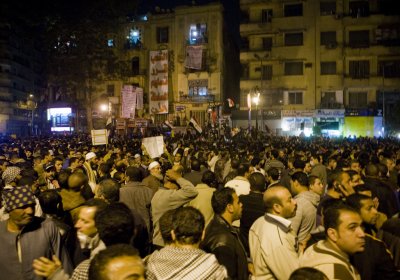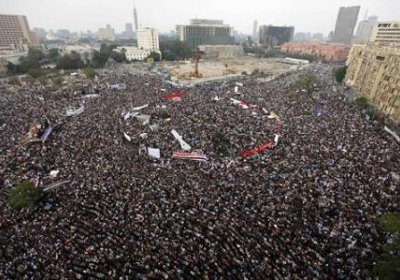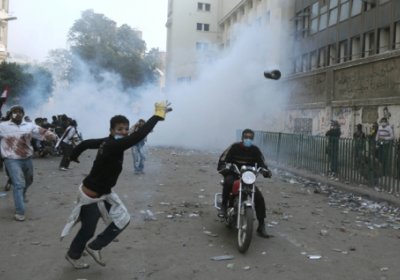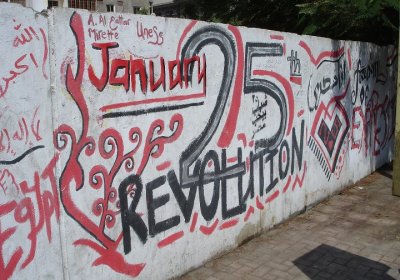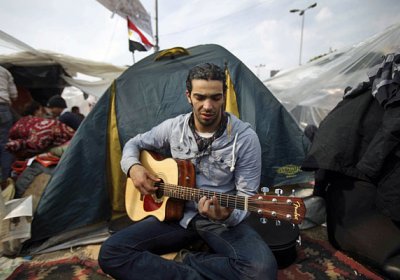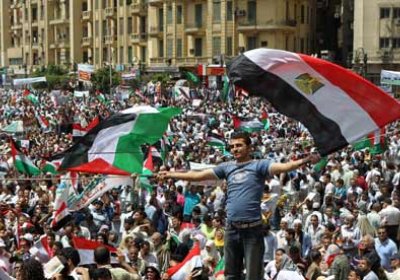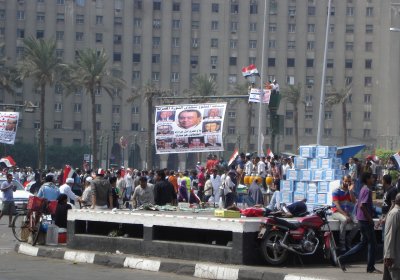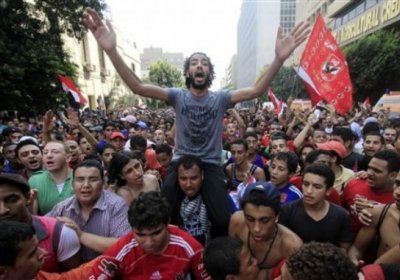Egyptians massed in Tahrir Square on January 27 to press the ruling junta to transfer power to a civilian administration and put generals on trial for killing protesters during the popular uprising last year.
The protest was staged on the first anniversary of the "Friday of Rage," one of the bloodiest days of the 18-day wave of protests a year ago that ousted former president Hosni Mubarak. Police and soldiers killed and wounded hundreds of protesters.
Egypt
Egyptians went to the polls on November 28 in the first round of parliamentary elections since dictator Hosni Mubarak was overthrown in February.
Large numbers of people turned out to vote despite calls from some revolutionary groups for a boycott of a process seen as a means to legitimise the rule of the Supreme Council of Armed Forces (SCAF).
The elections were held amid ongoing protests against the military regime by thousands of pro-democracy activists in Tahrir Square in Cairo and elsewhere across the country.
A new uprising has exploded in Egypt since police attacked protesters in Tahrir Square on November 19. Hundreds of thousands of people have taken to the streets in Cairo and other cities to demand the end of the Supreme Council of the Armed Forces (SCAF) that has governed Egypt since dictator Hosni Mubarak was overthrown in February. Dozens of people have been killed by the police and military and much larger numbers injured.
Egyptians say this is not a second revolution, it's a continuation of the first one. As hundreds of thousands take to the streets, they insist they will not stop until the military regime is gone.
Green Left Weekly’s Ted Walker spoke to two young members of the Egyptian Socialist Party, Basem Osman and Amr Bahaa, in Cairo in September. They discussed their experiences during the uprising against former dictator Hosni Mubarak and the future of Egypt’s revolution.
* * *
Why did you join the Egyptian Socialist Party?
Ramy Essam has been featured on my Rebel Frequencies site before. The young folk-singer may best be described at "the troubadour of the Egyptian revolution".
Essam performed at the initial rallies demanding dictator Hosni Mubarak step down, and was kidnapped and tortured as a result. And yet he still writes and performs.
Furthermore, his own personal struggle to sing publicly demonstrates how much more work the revolution still has ahead of it.
In September, Green Left Weekly spoke to Mamdouh Habashi and Dr Muhammad Hesham, members of the Egyptian Socialist Party (ESP), about developments in Egypt since the popular uprising overthrew dictator Hosni Mubarak on February 11.
The ESP is one of several new parties formed since Mubarak's ouster. A longer version of this interview can be found at ThawraEyewitness.blogspot.com.
* * *
What is the role of the Supreme Council of the Armed Forces (SCAF, who has been in power since Mubarak's ousting)?
The statement below was released by Socialist Alliance in Australia on October 14.
* * *
Walking around downtown Cairo on October 10, everything felt relatively normal ― if, perhaps, a little more tense than usual for post-January 25 Cairo.
That is, until I came across the wrecks of burnt out cars on the Corniche el Nil in Maspero, just north of Tahrir Square, being pulled apart by enterprising young men.
Tens of thousands of Egyptians reclaimed Tahrir square from police on September 9, demanding an end to military trials of civilians and for judicial freedom.
Security forces withdrew from the square on the day before. It had been under guard since a sit-in was broken up on August 1.
Groups of youth immediately started organising the September 9 rally. They marched through the streets of downtown Cairo demanding an end to the rule of the military council and calling for Cairo's residents to join the protest.
After the overthrow of Egyptian dictator Hosni Mubarak in February, a new chapter in Egyptian history is being written and its authors are the people themselves.
Egyptian scholar and researcher Samir Amin spoke with Hassane Zerrouky on the Arab revolts that have broken out this year, for L'Humanite. The interview was translated by Yoshie Furuhashi for www.mrzine.org . Abridged version appears below.
What's happening in the Arab world six months after the fall of dictator Ben Ali in Tunisia?
- Previous page
- Page 5
- Next page

